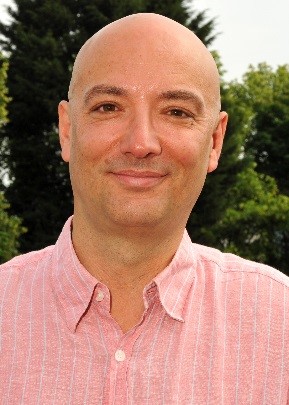 Andrea Manca, MSc PhD is a professor in the Centre for Health Economics at the University of York, where
he leads a research Programme on the Economics of Stratified, Personalised, and Precision Medicine supported by a portfolio of national and international competitive research funding. He is a member of the NICE Technology Appraisal Committee (since
2012) and Deputy Chair of the NIHR Doctoral Research Fellowships panel (since 2015). Dr Manca holds a MSc (health economics) and a PhD (economics), both from the University of York.
Andrea Manca, MSc PhD is a professor in the Centre for Health Economics at the University of York, where
he leads a research Programme on the Economics of Stratified, Personalised, and Precision Medicine supported by a portfolio of national and international competitive research funding. He is a member of the NICE Technology Appraisal Committee (since
2012) and Deputy Chair of the NIHR Doctoral Research Fellowships panel (since 2015). Dr Manca holds a MSc (health economics) and a PhD (economics), both from the University of York.
His research interests focus on developing methodological solutions to the issues faced by decision makers when dealing with complex health economics and outcomes research (HEOR) data to inform health policy. Dr Manca’s work involves the use of decision modelling, quantitative evidence synthesis, simulation and health econometrics. He has published extensively in methods and policy journals, as well as in applied general and specialist medical journals. With colleagues at York, he leads a range of successful short courses aimed at professionals in the healthcare sector.
Dr Manca is recognised for his methodological contributions to the analysis of multinational patient-level cost effectiveness data, where the aim is to inform reimbursement decisions in different jurisdictions. This work received the ISPOR Award for Excellence in Methodology in Pharmacoeconomics and Health Outcomes Research in 2008. Dr Manca received a number of other prestigious scholarships and awards from the UK National Institute for Health Research (2009) the Wellcome Trust (2007), and the BackCare Society (2004).
With more than 20 years' experience in HEOR, Dr Manca has contributed to ISPOR’s mission and activities since 2006. He has taught short courses (Transferability of Cost-Effectiveness Data Between Countries; Mapping to Estimate Utility Values from Non-Preference Based Outcome Measures) at ISPOR Europe and delivered invited specialist training courses to ISPOR regional chapters. Dr Manca has been a member of the Task Force on Mapping to Estimate Health-State Utility from Non-Preference-Based Outcome Measures (2014-2017). He has served on the Bernie O’Brien New Investigator Award committee (2015-2019) and as co-editor of Value in Health (2012-2017). Dr Manca is currently an Editorial Board Member of Value in Health and a member of the Precision Medicine and Advanced Therapies Special Interest Group.
Vision Statement by Andrea Manca, MSc PhD
In its first 25 years, ISPOR has become the primary reference point for professionals working in health economics and outcomes research (HEOR), growing in size, scope, and ambitions. Led initially by a handful of pioneers in the field, the ISPOR community
has turned into a family of more than 20,000 enthusiastic individuals from more than 110 countries worldwide, representing different disciplines, industries, and career stages. During this time, ISPOR has responded to the challenges posed (and has
taken the opportunities offered) by an ever-changing healthcare ecosystem. It has served its members by synthesising the relevant scientific knowledge and stimulating the creation of new knowledge, while supporting important initiatives such as network
building, job finding, mentoring and continuing professional development opportunities, collaborations, communication, and engagement with key stakeholders. Anyone attending one of the nowadays many ISPOR conferences knows what a vibrant and stimulating
events they are.
If elected I shall devote my energies to 3 areas of relevance to ISPOR’s activities:
- Innovative systems and infrastructures. The past 12 months have brought about new challenges and unexpected changes. We had to adapt in more ways than one could ever anticipate. Learning to use new software for remote teaching or to take part in meetings via video-conferencing facilities has been the least. Many of us had to embrace more flexible and innovative approaches to work/life balance. ISPOR has coped well, thanks to the wisdom of its leadership, dedicated staff, and the passion of its members. Online remote activities have increased opportunities for our existing members and created the chance to attract new ones who up to now may have been unable to participate in conferences, attend courses, and other events. As the world gradually delivers national vaccination programmes, professional organizations will be faced with the need to make a decision regarding whether to promote permanent changes to the format in which they deliver their activities (ie, face to face vs online remote delivery). As a member of the ISPOR Board of Directors I would coordinate consultation with our membership to seek their views regarding areas of ISPOR activity that may be better suit for long-term online delivery.
- Training, teaching, networking, and mentoring. I will espouse my passion for HEOR methods research and teaching with the technological developments brought about by the events of the past year. In this sense, I intend to work with the ISPOR leadership and its key stakeholders to identify innovative ways to reach our members and work with the experts in our field to design innovative formats to remotely deliver training, networking, and mentoring activities anchored in ISPOR members’ needs.
- Scientific and methods research excellence. The existing framework for HTA and the methods we use to evaluate novel health technologies are being tested to the limit. My third and final objective will be to work with ISPOR to engage with key stakeholders,
across disciplines and jurisdictions, to stimulate and support the development and improvements of HEOR methods and tools used to meet the challenges faced by HTA agencies and other decision makers.
I look forward to having the opportunity to work with ISPOR and its members for the next 3 years.
